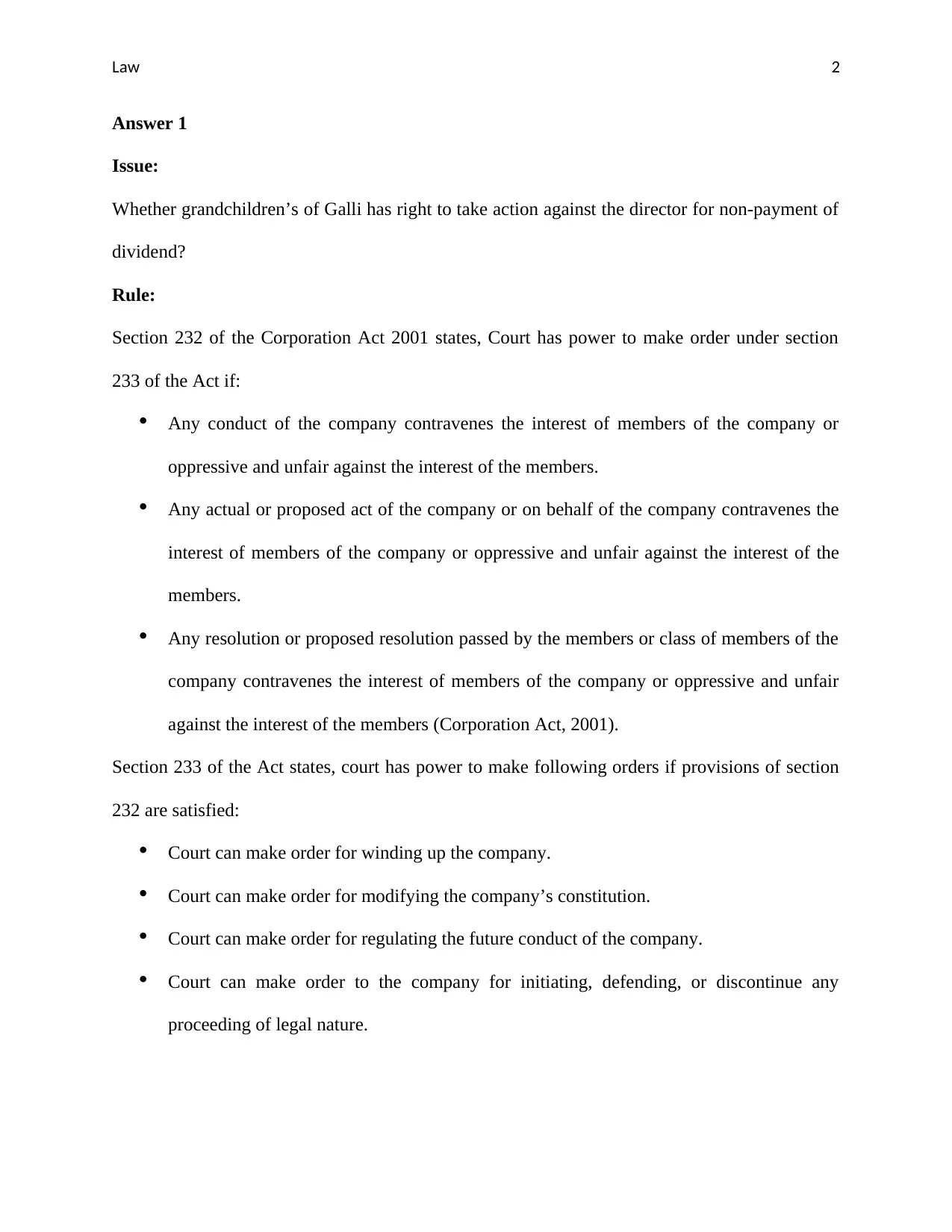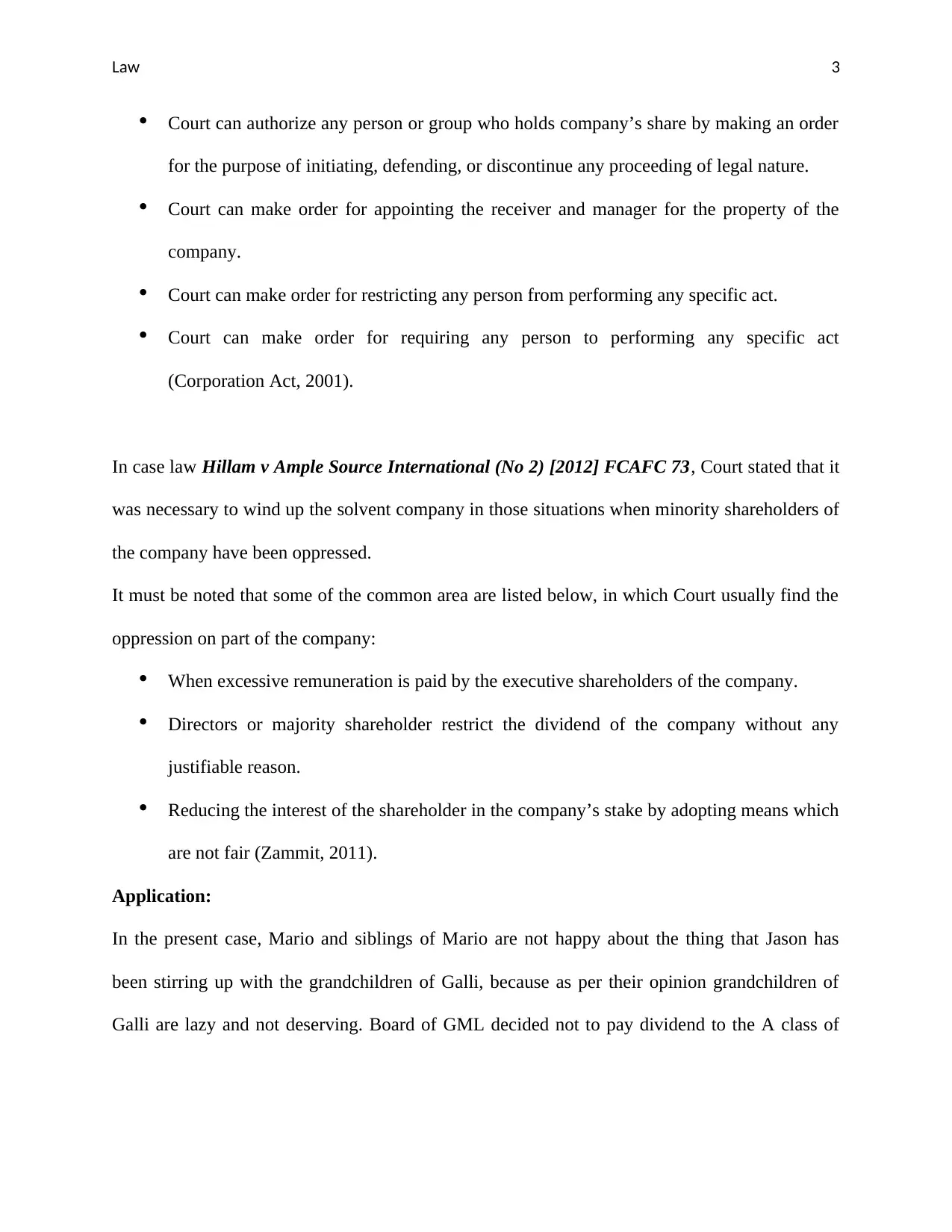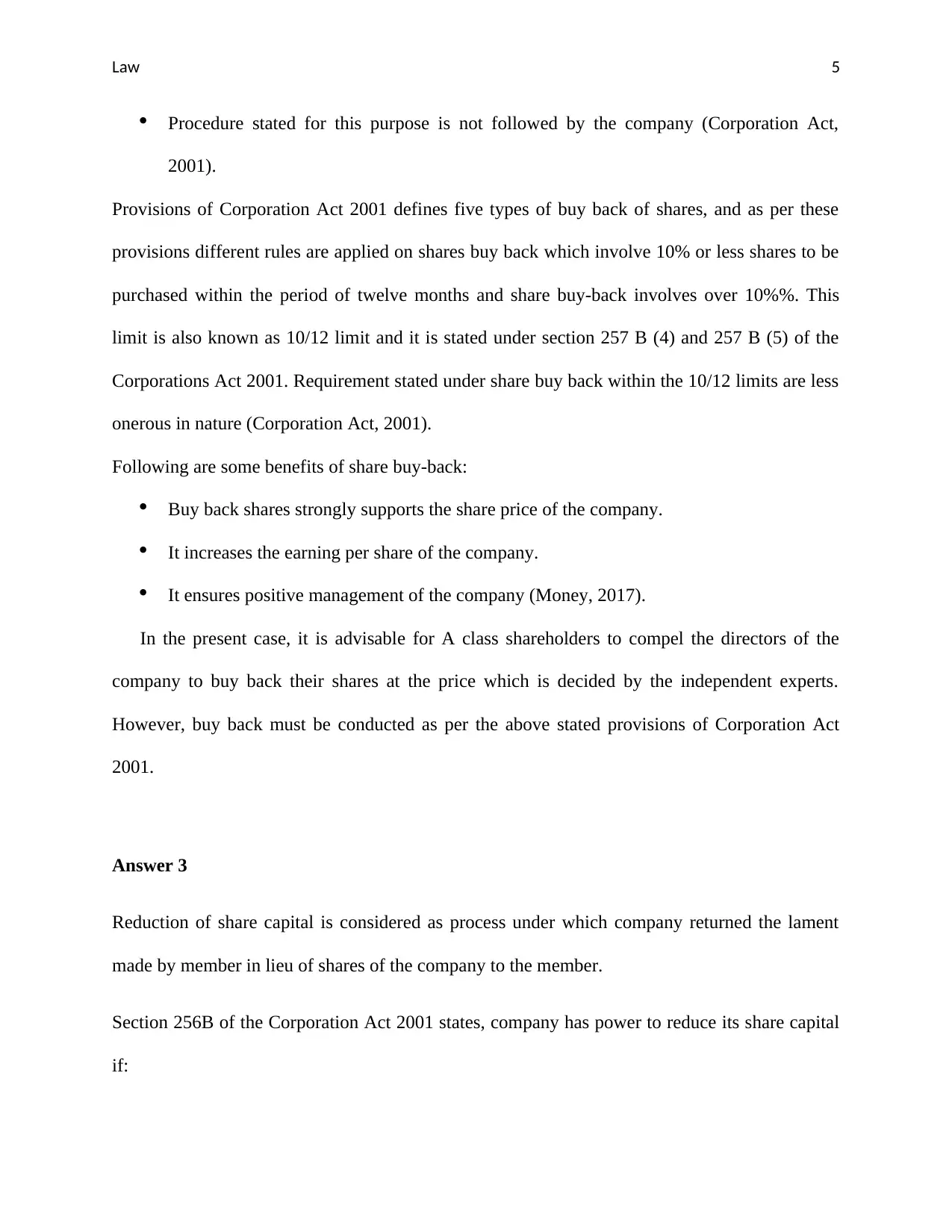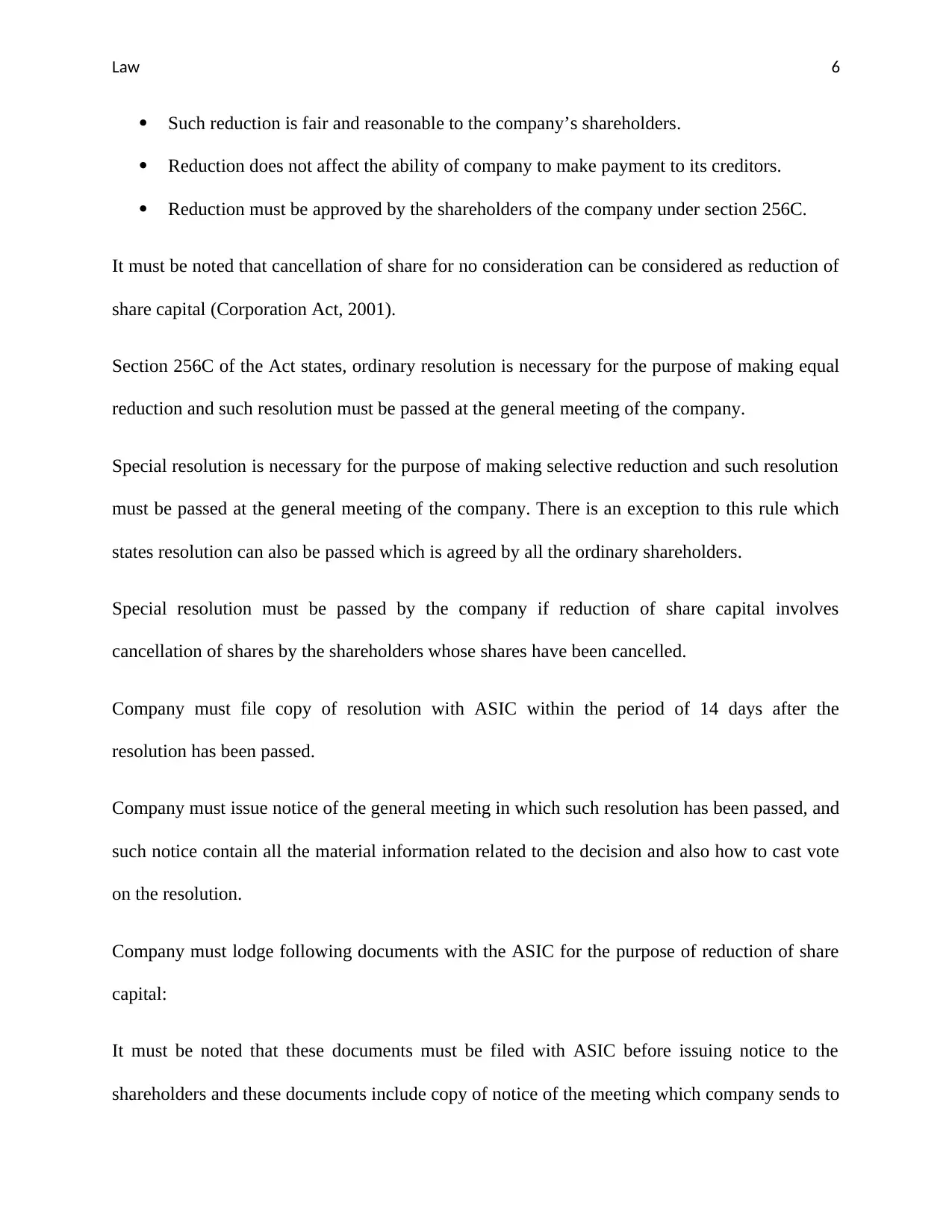Comprehensive Analysis of Shareholder Rights and Corporate Law Issues
VerifiedAdded on 2020/03/23
|7
|1452
|147
Homework Assignment
AI Summary
This law assignment addresses key issues in corporate law concerning shareholder rights. The first answer examines whether grandchildren of a shareholder can take action against a director for non-payment of dividends, analyzing the concept of shareholder oppression under Section 232 and 233 of the Corporations Act 2001, along with the relevant case law. The second answer explores share buybacks, their benefits, and the procedures as per the Corporations Act 2001, advising A class shareholders on compelling directors to repurchase shares. The third answer discusses the reduction of share capital, outlining the legal framework under Section 256B and 256C of the Corporations Act 2001, including the requirements for shareholder approval, resolutions, and filings with ASIC. The assignment provides a comprehensive overview of shareholder protection, corporate actions, and legal remedies, with references to relevant legislation and case law.

Running Head: Law 1
Law
Law
Paraphrase This Document
Need a fresh take? Get an instant paraphrase of this document with our AI Paraphraser

Law 2
Answer 1
Issue:
Whether grandchildren’s of Galli has right to take action against the director for non-payment of
dividend?
Rule:
Section 232 of the Corporation Act 2001 states, Court has power to make order under section
233 of the Act if:
Any conduct of the company contravenes the interest of members of the company or
oppressive and unfair against the interest of the members.
Any actual or proposed act of the company or on behalf of the company contravenes the
interest of members of the company or oppressive and unfair against the interest of the
members.
Any resolution or proposed resolution passed by the members or class of members of the
company contravenes the interest of members of the company or oppressive and unfair
against the interest of the members (Corporation Act, 2001).
Section 233 of the Act states, court has power to make following orders if provisions of section
232 are satisfied:
Court can make order for winding up the company.
Court can make order for modifying the company’s constitution.
Court can make order for regulating the future conduct of the company.
Court can make order to the company for initiating, defending, or discontinue any
proceeding of legal nature.
Answer 1
Issue:
Whether grandchildren’s of Galli has right to take action against the director for non-payment of
dividend?
Rule:
Section 232 of the Corporation Act 2001 states, Court has power to make order under section
233 of the Act if:
Any conduct of the company contravenes the interest of members of the company or
oppressive and unfair against the interest of the members.
Any actual or proposed act of the company or on behalf of the company contravenes the
interest of members of the company or oppressive and unfair against the interest of the
members.
Any resolution or proposed resolution passed by the members or class of members of the
company contravenes the interest of members of the company or oppressive and unfair
against the interest of the members (Corporation Act, 2001).
Section 233 of the Act states, court has power to make following orders if provisions of section
232 are satisfied:
Court can make order for winding up the company.
Court can make order for modifying the company’s constitution.
Court can make order for regulating the future conduct of the company.
Court can make order to the company for initiating, defending, or discontinue any
proceeding of legal nature.

Law 3
Court can authorize any person or group who holds company’s share by making an order
for the purpose of initiating, defending, or discontinue any proceeding of legal nature.
Court can make order for appointing the receiver and manager for the property of the
company.
Court can make order for restricting any person from performing any specific act.
Court can make order for requiring any person to performing any specific act
(Corporation Act, 2001).
In case law Hillam v Ample Source International (No 2) [2012] FCAFC 73, Court stated that it
was necessary to wind up the solvent company in those situations when minority shareholders of
the company have been oppressed.
It must be noted that some of the common area are listed below, in which Court usually find the
oppression on part of the company:
When excessive remuneration is paid by the executive shareholders of the company.
Directors or majority shareholder restrict the dividend of the company without any
justifiable reason.
Reducing the interest of the shareholder in the company’s stake by adopting means which
are not fair (Zammit, 2011).
Application:
In the present case, Mario and siblings of Mario are not happy about the thing that Jason has
been stirring up with the grandchildren of Galli, because as per their opinion grandchildren of
Galli are lazy and not deserving. Board of GML decided not to pay dividend to the A class of
Court can authorize any person or group who holds company’s share by making an order
for the purpose of initiating, defending, or discontinue any proceeding of legal nature.
Court can make order for appointing the receiver and manager for the property of the
company.
Court can make order for restricting any person from performing any specific act.
Court can make order for requiring any person to performing any specific act
(Corporation Act, 2001).
In case law Hillam v Ample Source International (No 2) [2012] FCAFC 73, Court stated that it
was necessary to wind up the solvent company in those situations when minority shareholders of
the company have been oppressed.
It must be noted that some of the common area are listed below, in which Court usually find the
oppression on part of the company:
When excessive remuneration is paid by the executive shareholders of the company.
Directors or majority shareholder restrict the dividend of the company without any
justifiable reason.
Reducing the interest of the shareholder in the company’s stake by adopting means which
are not fair (Zammit, 2011).
Application:
In the present case, Mario and siblings of Mario are not happy about the thing that Jason has
been stirring up with the grandchildren of Galli, because as per their opinion grandchildren of
Galli are lazy and not deserving. Board of GML decided not to pay dividend to the A class of
⊘ This is a preview!⊘
Do you want full access?
Subscribe today to unlock all pages.

Trusted by 1+ million students worldwide

Law 4
share, and keep that amount as retained earnings for the purpose of using that fund for the
development of organic vineyard at Robinvale.
In this case, grandchildren’s of Galli can take action under section 232 of the Act for the purpose
of making the Court to order under section 233 of the Act. In this case, oppression is present
because board of GML satisfied the provisions of section 232 as act of the company or on behalf
of the company contravenes the interest of members of the company or oppressive and unfair
against the interest of the members. Therefore, court can make order either to pay the dividend to
the minority shareholders or wound up the company.
Conclusion:
Grandchildren’s of Galli can take action under section 232 of the Act for the purpose of making
the Court to order under section 233 of the Act.
Answer 2
Buy back of shares is considered as a process under which company re-acquires its own stock.
This can be understood as company buy its shares back from the shareholders of the company. In
Australia, rules of buy back of shares are stated by ASIC and Corporation Act 2001. Buy back
must be conducted as per the provisions stated by corporation Act and ASIC otherwise such buy
back is void.
Section 257A of the Corporation Act 2001 states, company has power to buy back its shares
unless:
Such buy back of shares affect the ability of the company to make payment to its
creditors.
share, and keep that amount as retained earnings for the purpose of using that fund for the
development of organic vineyard at Robinvale.
In this case, grandchildren’s of Galli can take action under section 232 of the Act for the purpose
of making the Court to order under section 233 of the Act. In this case, oppression is present
because board of GML satisfied the provisions of section 232 as act of the company or on behalf
of the company contravenes the interest of members of the company or oppressive and unfair
against the interest of the members. Therefore, court can make order either to pay the dividend to
the minority shareholders or wound up the company.
Conclusion:
Grandchildren’s of Galli can take action under section 232 of the Act for the purpose of making
the Court to order under section 233 of the Act.
Answer 2
Buy back of shares is considered as a process under which company re-acquires its own stock.
This can be understood as company buy its shares back from the shareholders of the company. In
Australia, rules of buy back of shares are stated by ASIC and Corporation Act 2001. Buy back
must be conducted as per the provisions stated by corporation Act and ASIC otherwise such buy
back is void.
Section 257A of the Corporation Act 2001 states, company has power to buy back its shares
unless:
Such buy back of shares affect the ability of the company to make payment to its
creditors.
Paraphrase This Document
Need a fresh take? Get an instant paraphrase of this document with our AI Paraphraser

Law 5
Procedure stated for this purpose is not followed by the company (Corporation Act,
2001).
Provisions of Corporation Act 2001 defines five types of buy back of shares, and as per these
provisions different rules are applied on shares buy back which involve 10% or less shares to be
purchased within the period of twelve months and share buy-back involves over 10%%. This
limit is also known as 10/12 limit and it is stated under section 257 B (4) and 257 B (5) of the
Corporations Act 2001. Requirement stated under share buy back within the 10/12 limits are less
onerous in nature (Corporation Act, 2001).
Following are some benefits of share buy-back:
Buy back shares strongly supports the share price of the company.
It increases the earning per share of the company.
It ensures positive management of the company (Money, 2017).
In the present case, it is advisable for A class shareholders to compel the directors of the
company to buy back their shares at the price which is decided by the independent experts.
However, buy back must be conducted as per the above stated provisions of Corporation Act
2001.
Answer 3
Reduction of share capital is considered as process under which company returned the lament
made by member in lieu of shares of the company to the member.
Section 256B of the Corporation Act 2001 states, company has power to reduce its share capital
if:
Procedure stated for this purpose is not followed by the company (Corporation Act,
2001).
Provisions of Corporation Act 2001 defines five types of buy back of shares, and as per these
provisions different rules are applied on shares buy back which involve 10% or less shares to be
purchased within the period of twelve months and share buy-back involves over 10%%. This
limit is also known as 10/12 limit and it is stated under section 257 B (4) and 257 B (5) of the
Corporations Act 2001. Requirement stated under share buy back within the 10/12 limits are less
onerous in nature (Corporation Act, 2001).
Following are some benefits of share buy-back:
Buy back shares strongly supports the share price of the company.
It increases the earning per share of the company.
It ensures positive management of the company (Money, 2017).
In the present case, it is advisable for A class shareholders to compel the directors of the
company to buy back their shares at the price which is decided by the independent experts.
However, buy back must be conducted as per the above stated provisions of Corporation Act
2001.
Answer 3
Reduction of share capital is considered as process under which company returned the lament
made by member in lieu of shares of the company to the member.
Section 256B of the Corporation Act 2001 states, company has power to reduce its share capital
if:

Law 6
Such reduction is fair and reasonable to the company’s shareholders.
Reduction does not affect the ability of company to make payment to its creditors.
Reduction must be approved by the shareholders of the company under section 256C.
It must be noted that cancellation of share for no consideration can be considered as reduction of
share capital (Corporation Act, 2001).
Section 256C of the Act states, ordinary resolution is necessary for the purpose of making equal
reduction and such resolution must be passed at the general meeting of the company.
Special resolution is necessary for the purpose of making selective reduction and such resolution
must be passed at the general meeting of the company. There is an exception to this rule which
states resolution can also be passed which is agreed by all the ordinary shareholders.
Special resolution must be passed by the company if reduction of share capital involves
cancellation of shares by the shareholders whose shares have been cancelled.
Company must file copy of resolution with ASIC within the period of 14 days after the
resolution has been passed.
Company must issue notice of the general meeting in which such resolution has been passed, and
such notice contain all the material information related to the decision and also how to cast vote
on the resolution.
Company must lodge following documents with the ASIC for the purpose of reduction of share
capital:
It must be noted that these documents must be filed with ASIC before issuing notice to the
shareholders and these documents include copy of notice of the meeting which company sends to
Such reduction is fair and reasonable to the company’s shareholders.
Reduction does not affect the ability of company to make payment to its creditors.
Reduction must be approved by the shareholders of the company under section 256C.
It must be noted that cancellation of share for no consideration can be considered as reduction of
share capital (Corporation Act, 2001).
Section 256C of the Act states, ordinary resolution is necessary for the purpose of making equal
reduction and such resolution must be passed at the general meeting of the company.
Special resolution is necessary for the purpose of making selective reduction and such resolution
must be passed at the general meeting of the company. There is an exception to this rule which
states resolution can also be passed which is agreed by all the ordinary shareholders.
Special resolution must be passed by the company if reduction of share capital involves
cancellation of shares by the shareholders whose shares have been cancelled.
Company must file copy of resolution with ASIC within the period of 14 days after the
resolution has been passed.
Company must issue notice of the general meeting in which such resolution has been passed, and
such notice contain all the material information related to the decision and also how to cast vote
on the resolution.
Company must lodge following documents with the ASIC for the purpose of reduction of share
capital:
It must be noted that these documents must be filed with ASIC before issuing notice to the
shareholders and these documents include copy of notice of the meeting which company sends to
⊘ This is a preview!⊘
Do you want full access?
Subscribe today to unlock all pages.

Trusted by 1+ million students worldwide

Law 7
its shareholders and any document which related with the reduction of share capital for which
company sends notice to the members (Corporation Act, 2001).
References:
Corporation Act 2001- Section 232.
Corporation Act 2001- Section 233.
Corporation Act 2001- Section 256B.
Corporation Act 2001- Section 256C.
Corporation Act 2001- Section 257A.
Corporation Act 2001- Section 257B.
Hillam v Ample Source International (No 2) [2012] FCAFC 73.
Money, S. (2017). Share buybacks: who really benefits. Viewed at:
https://www.ft.com/content/4c61165a-e98a-11e4-b863-00144feab7de?mhq5j=e6. Accessed on
28th September 2017.
Zammit, M. (2011). Shareholder’s Opression. Viewed at:
http://www.austlii.edu.au/cgi-bin/viewdb/au/legis/cth/consol_act/ca2001172/. Accessed on 28th
September 2017.
its shareholders and any document which related with the reduction of share capital for which
company sends notice to the members (Corporation Act, 2001).
References:
Corporation Act 2001- Section 232.
Corporation Act 2001- Section 233.
Corporation Act 2001- Section 256B.
Corporation Act 2001- Section 256C.
Corporation Act 2001- Section 257A.
Corporation Act 2001- Section 257B.
Hillam v Ample Source International (No 2) [2012] FCAFC 73.
Money, S. (2017). Share buybacks: who really benefits. Viewed at:
https://www.ft.com/content/4c61165a-e98a-11e4-b863-00144feab7de?mhq5j=e6. Accessed on
28th September 2017.
Zammit, M. (2011). Shareholder’s Opression. Viewed at:
http://www.austlii.edu.au/cgi-bin/viewdb/au/legis/cth/consol_act/ca2001172/. Accessed on 28th
September 2017.
1 out of 7
Related Documents
Your All-in-One AI-Powered Toolkit for Academic Success.
+13062052269
info@desklib.com
Available 24*7 on WhatsApp / Email
![[object Object]](/_next/static/media/star-bottom.7253800d.svg)
Unlock your academic potential
Copyright © 2020–2026 A2Z Services. All Rights Reserved. Developed and managed by ZUCOL.





